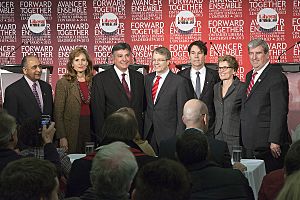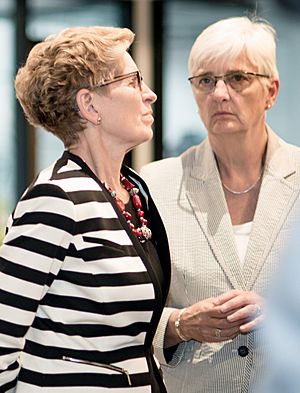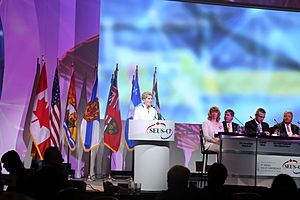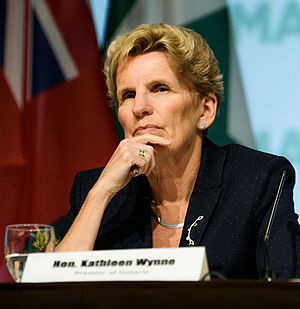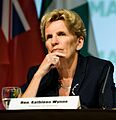Kathleen Wynne facts for kids
Quick facts for kids
Kathleen Wynne
|
|||||||||||||||||||||||||||||||||||||||||||||||||||||||||||||||||||
|---|---|---|---|---|---|---|---|---|---|---|---|---|---|---|---|---|---|---|---|---|---|---|---|---|---|---|---|---|---|---|---|---|---|---|---|---|---|---|---|---|---|---|---|---|---|---|---|---|---|---|---|---|---|---|---|---|---|---|---|---|---|---|---|---|---|---|---|
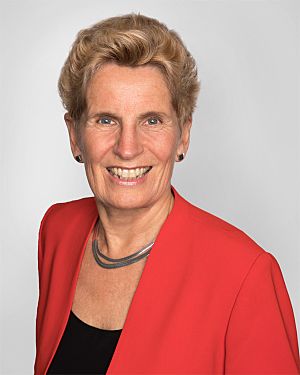
Wynne in 2017
|
|||||||||||||||||||||||||||||||||||||||||||||||||||||||||||||||||||
| 25th Premier of Ontario | |||||||||||||||||||||||||||||||||||||||||||||||||||||||||||||||||||
| In office February 11, 2013 – June 29, 2018 |
|||||||||||||||||||||||||||||||||||||||||||||||||||||||||||||||||||
| Monarch | Elizabeth II | ||||||||||||||||||||||||||||||||||||||||||||||||||||||||||||||||||
| Lieutenant Governor | David Onley Elizabeth Dowdeswell |
||||||||||||||||||||||||||||||||||||||||||||||||||||||||||||||||||
| Preceded by | Dalton McGuinty | ||||||||||||||||||||||||||||||||||||||||||||||||||||||||||||||||||
| Succeeded by | Doug Ford | ||||||||||||||||||||||||||||||||||||||||||||||||||||||||||||||||||
| Member of the Ontario Provincial Parliament for Don Valley West |
|||||||||||||||||||||||||||||||||||||||||||||||||||||||||||||||||||
| In office October 2, 2003 – May 3, 2022 |
|||||||||||||||||||||||||||||||||||||||||||||||||||||||||||||||||||
| Preceded by | David Turnbull | ||||||||||||||||||||||||||||||||||||||||||||||||||||||||||||||||||
| Succeeded by | Stephanie Bowman | ||||||||||||||||||||||||||||||||||||||||||||||||||||||||||||||||||
|
|||||||||||||||||||||||||||||||||||||||||||||||||||||||||||||||||||
| Personal details | |||||||||||||||||||||||||||||||||||||||||||||||||||||||||||||||||||
| Born |
Kathleen O'Day Wynne
May 21, 1953 Richmond Hill, Ontario, Canada |
||||||||||||||||||||||||||||||||||||||||||||||||||||||||||||||||||
| Political party | Ontario Liberal | ||||||||||||||||||||||||||||||||||||||||||||||||||||||||||||||||||
| Spouses |
Phil Cowperthwaite
(m. 1977; div. 1991)Jane Rounthwaite
(m. 2005) |
||||||||||||||||||||||||||||||||||||||||||||||||||||||||||||||||||
| Children | 3 | ||||||||||||||||||||||||||||||||||||||||||||||||||||||||||||||||||
| Alma mater |
|
||||||||||||||||||||||||||||||||||||||||||||||||||||||||||||||||||
| Occupation | Politician | ||||||||||||||||||||||||||||||||||||||||||||||||||||||||||||||||||
| Signature | |||||||||||||||||||||||||||||||||||||||||||||||||||||||||||||||||||
Kathleen O'Day Wynne was a Canadian politician who served as the 25th Premier of Ontario. She was also the leader of the Ontario Liberal Party from 2013 to 2018. She represented Don Valley West as a MPP from 2003 to 2022. Kathleen Wynne made history as the first female Premier of Ontario. She was also the first openly gay Premier in Canada.
Wynne first became a public official as a trustee for the Toronto District School Board (TDSB) in 2000. She was elected to the Ontario Legislature in 2003. Under Premier Dalton McGuinty, she held several important roles in the government. She became Premier and leader of the Liberal Party in 2013.
As Premier, Wynne introduced free prescription drug coverage for children. She also increased the minimum wage and made post-secondary education free for lower-income families. Her government also updated the curriculum for health education. They also worked on a system to price pollution with Quebec and California. A part of Hydro One, an electricity company, was also sold.
Wynne sought another term in the 2018 election. However, her party did not win and lost many seats. She resigned as Liberal leader and later as Premier. She continued to serve as an MPP until 2022, when she retired from politics.
Contents
Early Life and Education
Kathleen O'Day Wynne was born on May 21, 1953, in Richmond Hill, Ontario. Her parents were Dr. John B. Wynne and Patsy O'Day. Her mother was a musician who grew up in Nassau, Bahamas, before moving to Canada.
Wynne grew up in Richmond Hill. She earned a Bachelor of Arts degree from Queen's University. She also received a Master of Arts degree in linguistics from the University of Toronto. Later, she earned a Master of Education degree in adult education. This degree was from the Ontario Institute for Studies in Education (University of Toronto).
Before entering politics, Wynne was involved in community work. She served as president of the Toronto Institute of Human Relations. In 1996, she helped start Citizens for Local Democracy. This group was against the joining of different parts of Metropolitan Toronto. She also founded the Metro Parent Network, which supports public education.
Kathleen Wynne has three children from her first marriage. She later married her partner, Jane Rounthwaite, in July 2005. Wynne is a member of the United Church of Canada.
Becoming a School Trustee
Wynne first ran to be a school trustee in 1994 but was not elected. In 2000, she ran again and was elected as a trustee for the Toronto District School Board. During her campaign, some groups tried to criticize her because of her personal life. Wynne strongly disagreed with cuts to public education.
In 2001, Wynne helped pass a rule that encouraged schools to use teaching materials. These materials would show that gay and lesbian parents are part of modern families. She ran for chair of the school board in December 2001 but was not chosen for that role.
Starting in Provincial Politics
Wynne was a co-founder of Citizens for Local Democracy. This group opposed the joining of the old City of Toronto with the rest of Metropolitan Toronto in 1999. She tried to enter provincial politics in 1999 but did not win the party nomination.
In 2003, she became the Liberal candidate for Don Valley West. In the 2003 provincial election, she won against David Turnbull. The Liberals won the election, and Wynne became a parliamentary assistant. She worked for the Minister of Training, Colleges and Universities. Later, she became a parliamentary assistant to the Minister of Education.
On September 18, 2006, she became the Minister of Education. She was the first openly lesbian cabinet minister in Ontario. On January 18, 2010, she became the Minister of Transportation. In 2011, she was appointed Minister of Municipal Affairs and Housing and Minister of Aboriginal Affairs.
In the 2007 provincial election, Wynne was challenged by the PC leader John Tory. Wynne was re-elected with 50.4 percent of the votes. She defeated Tory, who came in second.
Becoming Liberal Party Leader
Premier Dalton McGuinty announced on October 15, 2012, that he would step down. He would resign as leader of the Ontario Liberal Party and Premier.
On November 2, 2012, Wynne resigned from her cabinet role. Three days later, she announced she would run for the party's leadership. Wynne was seen as having a strong team supporting her. She had the most supporters running to be delegates at the convention.
At the convention on January 26, 2013, Wynne spoke about improving relationships with teachers. She also talked about working with other political parties. She mentioned that she was ready to govern and would bring the legislature back on February 19. Wynne also spoke about her personal life. She said, "I don't believe the people of Ontario judge their leaders on the basis of race, colour or sexual orientation."
After the first round of voting, Wynne was very close to the lead. Other candidates who were eliminated or withdrew then supported her. With their support, she won the leadership on the third ballot. She received 57 percent of the votes.
Serving as Premier (2013–2018)
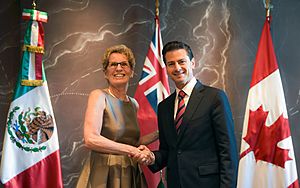
Kathleen Wynne was sworn in as Premier of Ontario on February 11, 2013. She became the first female Premier of the province. She was also the first Premier in Canada to be openly gay.
Government Accountability
After becoming Premier, Wynne faced questions about decisions made by the previous government. These questions were about the cancellation of gas plant projects. Wynne stated she was not involved in these decisions. She asked the Auditor General to investigate the costs.
The Auditor General's report in October 2013 suggested the cancellations could cost taxpayers up to $1.1 billion. Wynne admitted the gas plant relocations "shouldn't have happened." She apologized and promised to prevent similar issues in the future.
In April 2014, investigators stated there was no evidence Wynne was involved in deleting emails related to the gas plants. The investigation focused on other staff members.
On March 24, 2014, Wynne introduced a new law. It was called the Public Sector and MPP Accountability and Transparency Act. This law aimed to make the government more open and responsible. It required politicians and their staff to post their expenses online. It also increased the powers of the Integrity Commissioner and Ombudsman. The law also introduced a fine for destroying government records on purpose.
Hydro One Changes
In 2016, Kathleen Wynne's government decided to sell 30 percent of Hydro One to private owners. Hydro One is an electric utility company owned by the government. The government used about four billion dollars from the sale to pay off debt. The other five billion dollars went to a fund to improve transit and build infrastructure.
This decision faced a lot of criticism. Many people in Ontario did not agree with selling parts of Hydro One.
2013 Budget and Economy
On March 21, 2013, Wynne introduced her government's first budget. It included a $295 million investment for a youth jobs strategy. This aimed to help with high youth unemployment. The budget also aimed to reduce auto insurance rates by 15 percent. It invested $260 million to improve home care health services for seniors.
The budget also included a $45 million investment for an Ontario Music Fund. It increased the Ontario Child Benefit to support low-income families. The budget passed on June 11, 2013, with support from the New Democratic Party (NDP).
On January 30, 2014, Wynne announced an increase to the minimum wage. It went from $10.25 to $11.00. She also introduced a law to make sure future minimum wage increases keep up with the cost of living. Wynne also announced a partnership with Cisco Canada. This partnership was expected to create 1,700 new jobs.
Between October and November 2014, Wynne went on a trade mission to China. This trip brought about a billion dollars in investment to Ontario. It also created 1,800 new jobs. By the end of 2015, Ontario's unemployment rate was lower than the national average.
Education Initiatives
Kathleen Wynne's time as Premier saw some challenges with teachers' unions. She started new talks with the Elementary Teachers' Federation of Ontario (ETFO). This followed a period of disagreements.
On April 8, 2014, Wynne's government reached a new agreement with teacher unions. They passed a law that gave teachers back their bargaining rights. It also gave them the right to strike. The law kept a wage freeze for teachers. It also gave the Minister of Education power to check school board spending. Wynne also created the Premier's Youth Advisory Council. This council advises the Premier on issues affecting young people.
In February 2015, her government updated the health education curriculum. This curriculum had not been updated since 1998. These changes caused some debate among parents and other groups.
2014 Provincial Election
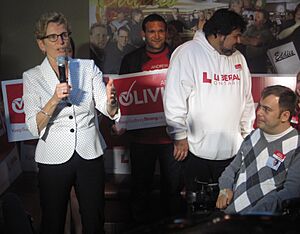
In the spring of 2014, many people thought a general election would happen. This was because the NDP's support was needed for the Liberal government's budget to pass. On May 1, 2014, Wynne's government presented its budget. It was described as "NDP-friendly" by many experts.
The budget included wage increases for home care and child care workers. It also had a $29 billion plan for transportation. This plan would fund roads, bridges, and transit. The budget also proposed an Ontario Registered Pension Plan. This plan would add to the Canada Pension Plan. It also included higher taxes for high-income earners.
The NDP leader, Andrea Horwath, announced that her party would not support the budget. This meant the province would go into a general election. The election was set for June 12, 2014.
Early in the campaign, polls showed a close race between Wynne's Liberals and Tim Hudak's PCs. Wynne ran a campaign with few major problems. Her performance in the televised leaders' debate on June 3 was criticized by some. However, the NDP's slow start and Hudak's unpopular plan to cut 100,000 jobs helped Wynne.
Wynne's Liberals won the election. They moved from a minority government to a majority government. This meant they had more than half the seats in the legislature. Voter turnout also increased to 52.1 percent. Wynne herself was re-elected in her riding of Don Valley West.
2015 and 2016 Budgets
In 2015, Kathleen Wynne's government continued to make changes. They partially privatized Hydro One. They also changed laws to allow beer sales in Ontario grocery stores.
Wynne also focused on expanding public transit. On April 21, 2015, she announced that the province would pay for the entire cost of the Hurontario–Main LRT project. This project would connect Mississauga with Brampton. On May 26, 2015, Wynne announced that the government would fund an LRT system in Hamilton.
The 2016 budget planned for $133.9 billion in spending. It aimed to balance the budget by 2017–18. The province also revealed its climate change plan. This plan introduced a system to price pollution, similar to those in California and Quebec. As a result, gasoline prices and natural gas rates increased in 2017.
In education, the government announced free college and university tuition for students. This was for students from families earning less than $50,000 per year.
Public Opinion and Social Media
In June 2016, a poll showed that Wynne's approval rating had dropped. By March 2017, another poll reported her approval rating had fallen to 12 percent. This was the lowest ever recorded for an Ontario Premier.
Wynne also faced negative comments on social media. While most comments were about her political record, some included disrespectful language. Wynne believed that the situation could change if people spoke up against such behavior.
Leading to the 2018 Election
In 2016, the government offered rebates for electric vehicles. In March 2018, these incentives were changed. In March 2017, the Liberal government announced "free tuition" for families earning less than $50,000. This was done by updating the Ontario Student Assistance Program (OSAP).
Ontario's minimum wage increased from $11.60 to $14.00 on January 1, 2018. Wynne also planned to increase it to $15.00 the following year. Also, from January 1, 2018, prescription drugs became free for people aged 24 and under.
2018 Provincial Election Outcome
Wynne's Liberals entered the 2018 provincial election campaign behind the PCs. The PCs were led by Doug Ford. Polls in early April showed the PCs ahead.
Wynne described the election as a "stark choice." She said voters could choose between "cutting and removing supports from people" or expanding social programs. The Liberal platform promised new spending for free childcare and expanded dental care. This budget projected a deficit until 2024–2025.
On June 2, five days before the election, Wynne admitted that the Liberals would not win a fifth term. She urged voters to support Liberal candidates to prevent a PC or NDP majority. However, the election resulted in a PC majority government. The NDP became the official opposition.
The Liberals lost almost half their votes from 2013. They were reduced to seven seats. This was their worst result since Confederation. It was one seat short of the eight needed for official party status. Wynne narrowly kept her own riding of Don Valley West. She announced her resignation as Liberal Party leader on election night. On June 29, 2018, Wynne formally resigned as Premier. Lieutenant Governor Elizabeth Dowdeswell appointed Doug Ford as her successor.
On October 20, 2020, Wynne announced that she would not run in the next provincial election. She retired from politics in 2022.
Images for kids
See also
 In Spanish: Kathleen Wynne para niños
In Spanish: Kathleen Wynne para niños
 | Bessie Coleman |
 | Spann Watson |
 | Jill E. Brown |
 | Sherman W. White |


